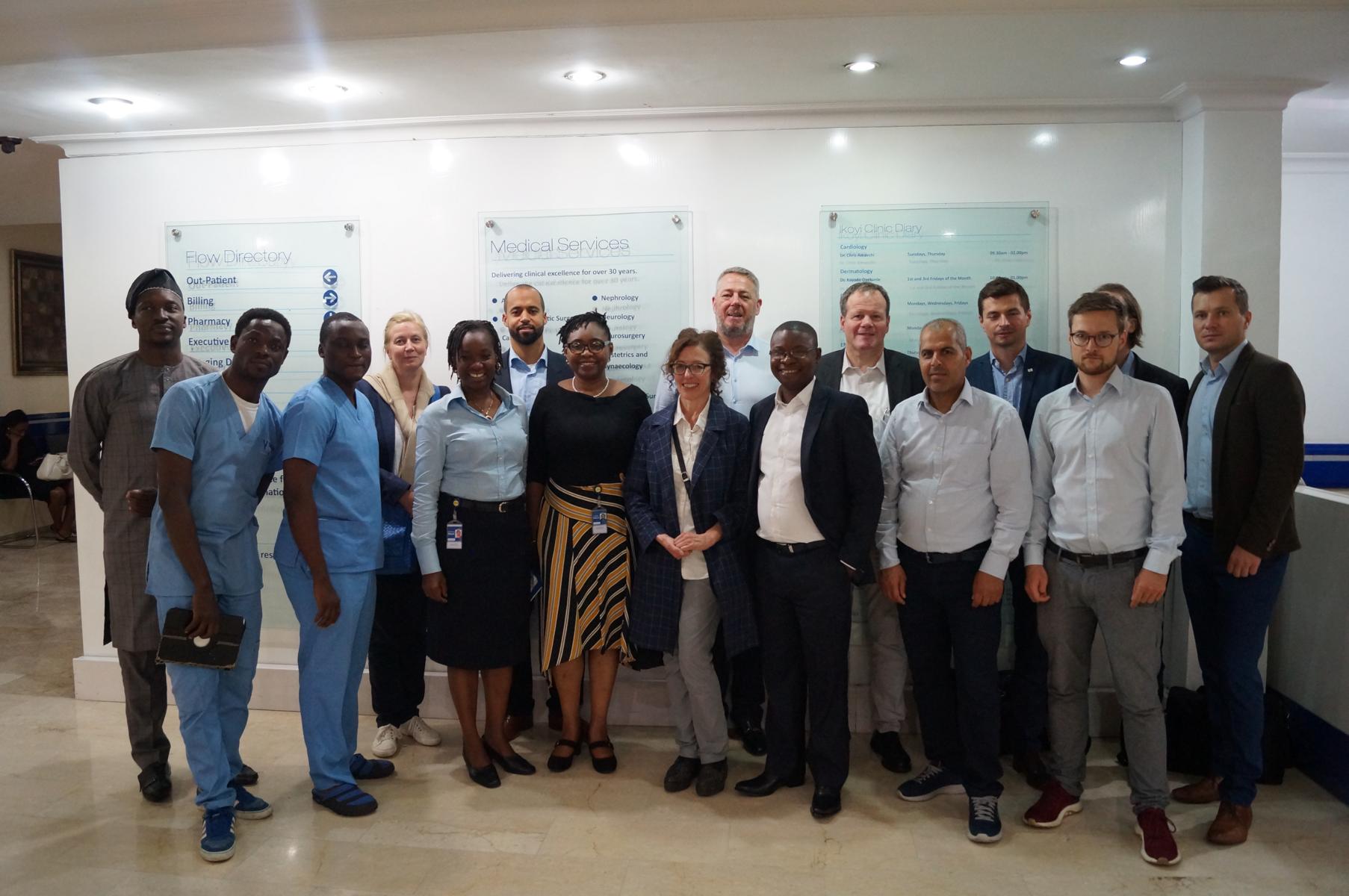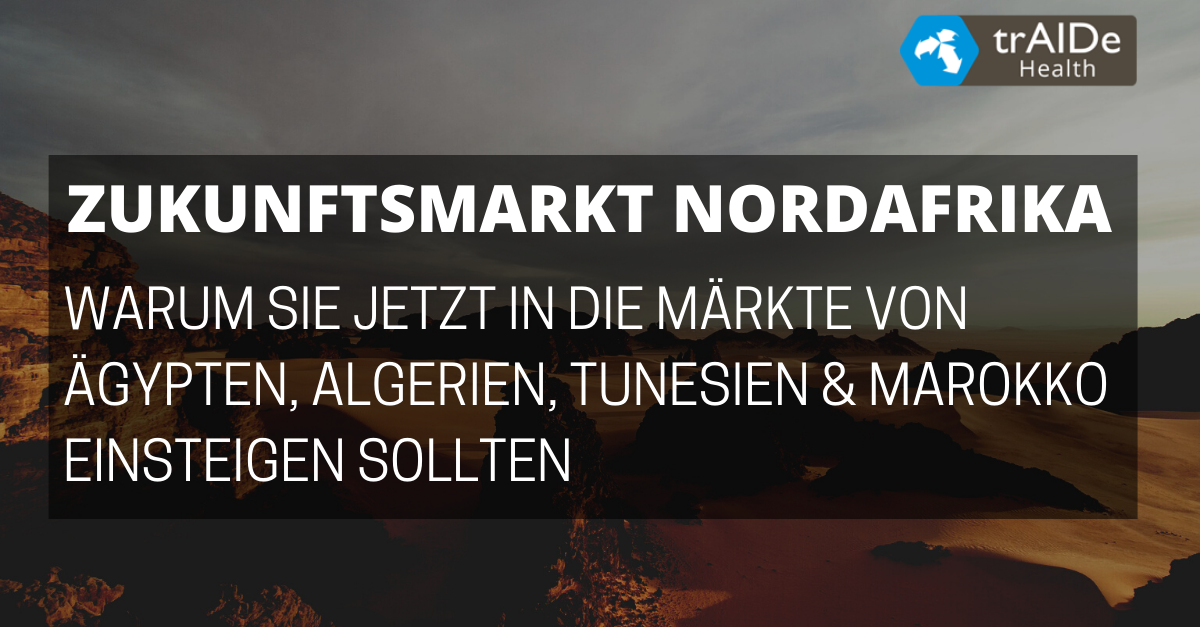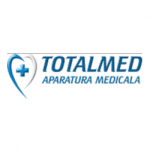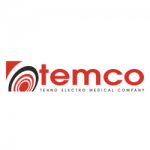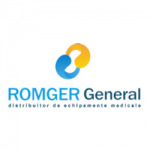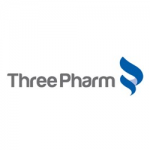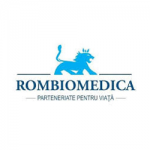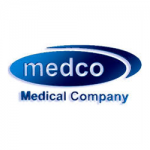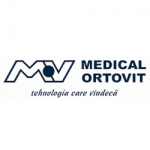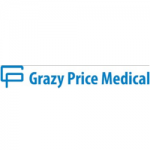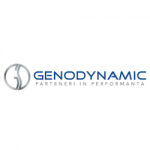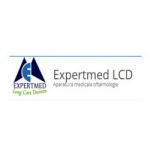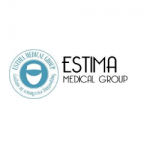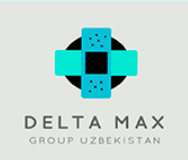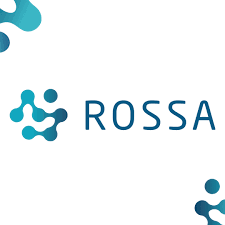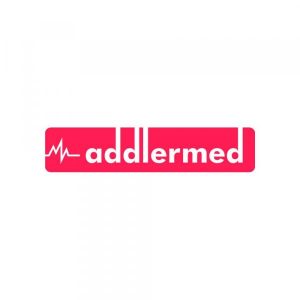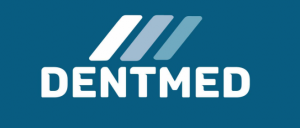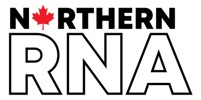Nordafrika als Zukunftsmarkt für die deutsche Gesundheitswirtschaft
Unsere Gesundheit ist unser höchstes Gut: Dies wird nicht zuletzt in Zeiten der Pandemie immer deutlicher. Daher ist es wichtig, diese zu fördern und zu schützen – und zwar auf der ganzen Welt!
Besonders der boomende Gesundheitsmarkt Nordafrikas bietet viele Chancen. Nicht ohne Grund wird das Potential der Region bereits von vielen Unternehmen in Ägypten, Algerien, Tunesien und Marokko genutzt.
Daher haben wir Ihnen hier die wichtigsten Gründe zusammengestellt, warum auch Sie in die nordafrikanischen Märkte einsteigen sollten:
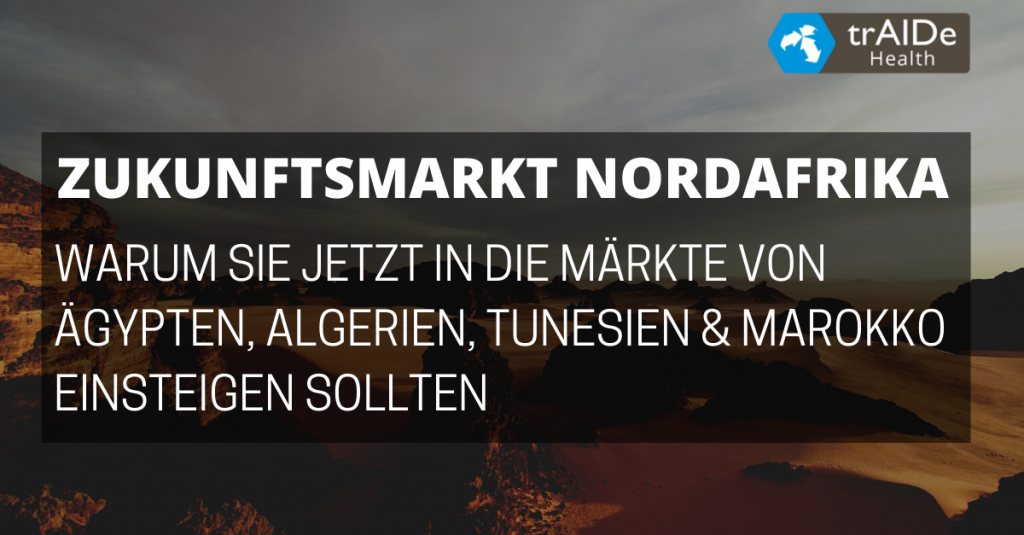
Warum sollten Sie Nordafrika als Zukunftsmarkt nutzen?
Die nordafrikanischen Gesundheitsmärkte sind von Fortschritt geprägt: Ihre rasanten Weiterentwicklungen bieten viel Potenzial, in die lokalen Märkte einzusteigen. Dabei bleiben die Prognosen des Wirtschaftswachstums und der Erholung nach Covid-19 positiv, sodass ein Stopp des Fortschritts nicht zu befürchten ist. Ein guter Zeitpunkt, um jetzt hier einzusteigen!
Warum ist Ägypten ein Zukunftsmarkt?
Kontinuierliches Wachstum, eine Vielzahl spannender Projekte und die Finanzierung von außen sowie innen machen den ägyptischen Gesundheitsmarkt zu einem der Märkte, in den Sie jetzt einsteigen sollten! Der „Emerging Market Darling“ Ägypten ist bereits seit 2017 ein Top-Empfänger ausländischer Direktinvestitionen, welche zusammen mit den staatlichen Investitionen anhaltendes Wachstum sichern. So hat die Regierung beispielsweise 237 Millionen Euro in die Errichtung von 30 neuen Krankenhäusern investiert sowie weitere 44,6 Millionen Euro spezifisch in die Verbesserung des Krankenwagen- und Rettungsdienstleistungssystems. Aber auch verschiedene Organisationen treiben den ägyptischen Gesundheitsmarkt voran: Die Alfa Medical (AMG) plant in den nächsten fünf Jahren 263,5 Millionen Euro in den Markt zu investieren, um unter anderem die Kapazitäten in Krankenhäusern durch weitere Betten zu erhöhen, während in der Pharmaindustrie CDC, EBRD und DPI eine Pharma-Investment Plattform gestartet und so bereits 205,5 Millionen Euro in die Pharmaindustrie investiert haben. Dies soll bezwecken, dass Medikamente besser verfügbar und bezahlbarer werden. Als erster nutzt der ägyptische Medizinhersteller Adwia Pharmaceuticals in Zusammenarbeit mit dem indischen Partner Celon Laboratories diese Förderung, um seine Produkte, Produktionsstätten und Standards zu verbessern.
So ergeben sich insgesamt für Sie einige Möglichkeiten, erfolgreich in den Markt einzusteigen:
- Errichtung von Medical Cities: Ein Beispiel hierfür ist die Capital Med in Badr City. Diese ist mit 57,7 Hektar die größte internationale, medizinische Einrichtung im mittleren Osten, wodurch sie einen wichtigen Beitrag zur lokalen Gesundheitsversorgung leistet. Hierzu dienen zahlreiche medizinische Einrichtungen, welche sich Rehabilitation, Trauma, Transplantationen, Forschung, personalisierter Medizin und vielen weiteren Bereichen der Gesundheit widmen. Somit entsteht in verschiedenen Bereichen eine Nachfrage an Produkten und Dienstleistungen:
- Health-Tech
- Training von Gesundheitspersonal
- Pharmaindustrie
- Medizinische Einrichtungen
- Medizinische Ausstattung
- Etc.
- Nationales Programm für die lokale pharmazeutische Industrie
- Großes Potential für die Medizintechnik: Import und lokale Produktion
- Bemühungen eine allgemeine Krankenversicherung zu etablieren
Warum ist Algerien ein Zukunftsmarkt?
Mit einem kontinuierlichen jährlichen Wachstum von 11% bietet Algerien als Zukunftsmarkt immer wieder Chancen in der Gesundheitswirtschaft. Diese wird durch öffentliche Finanzierungen sowie den viertgrößten eigenen Staatsausgaben von 2,6 Milliarden Euro, allein in 2021, unterstützt: So konnte bereits ein kostenloses, öffentlich zugängliches Gesundheitssystem etabliert werden, welches alle Bürger umfasst, unabhängig von Alter oder finanzieller Situation. So kann jeder Bürger medizinische Maßnahmen in Anspruch nehmen. Daraus ergeben sich auch für die deutsche Gesundheitswirtschaft Möglichkeiten, denn:
- 95% der medizinischen Ausrüstung mit einem Gesamtvolumen von 700 Millionen Euro werden importiert
- Der algerische Markt für Medizinprodukte ist von der öffentlichen Beschaffung über Ausschreibungen abhängig
- Es gibt ca. zwei Ausschreibungen pro Woche für die Lieferung von medizinischen Geräten
- Der pharmazeutische Bedarf wächst:
- Im ersten Quartal 2020 sind die Arzneimittelimporte im Vergleich zum Vorjahr um 20,45% gestiegen.
- Der Umsatz für 2021 wird auf rund 4,5 Milliarden Euro prognostiziert.
- Es gibt ca. 100 Betriebe (hiervon etwa 50 ausländische Firmen wie Merck und Bayer), die fast 2000 pharmazeutische Produkte herstellen
- Im privaten Sektor ist der Neubau von 3-4 Kliniken pro Jahr geplant sowie 50 Projekte für die Produktion von medizinischen Geräten
- Hier ergibt sich unter anderem die Möglichkeit, Ausrüstung zu liefern und Joint-Venture-Partnerschaften einzugehen
- Digitalisierung: Der algerische Gesundheitsmarkt wird dank einer Digitalisierungsstrategie, welche die verschiedensten Projekte beinhaltet, immer digitaler:
- Projekt eines digitalen Krankenhauses
- Projekt zur Konsolidierung von Informationen zur elektronischen Krankenakte des Patienten
- E-Apothekenprojekt
- Die Bekämpfung von Krebs wird staatlich gefördert und gilt als ein Fokusgebiet, wodurch ein langfristiger Bedarf an Reagenzien, bildgebender Diagnostik und Prävention entsteht
Warum ist Tunesien ein Zukunftsmarkt?
Auch Tunesien bietet deutschen Unternehmen einen attraktiven Absatzmarkt: Dank des umfassenden Gesundheitssystems, welches zu den besten des afrikanischen Kontinents zählt, lassen sich hier viele Möglichkeiten für einen Markteinstieg finden. Dabei finden sich sowohl staatliche Gesundheitseinrichtungen (2200), als auch Privatkliniken (117) vor Ort. Nicht zuletzt aus diesen Gründen ist Tunesien die Destination für Inbound Medizintourismus – sowohl für Nordafrika als auch zunehmend für frankophone westafrikanische Länder. So entsteht hier ein großer Bedarf an deutschem Top-Equipment, welcher gedeckt werden muss. Der Privatsektor spielt daher eine wichtige Rolle.
Aber auch die gut entwickelte pharmazeutische Industrie sowie die Entwicklung von E-Health bieten vielversprechende Einstiegschancen. Es wird deutlich, dass die Gesundheitswirtschaft in Tunesien eine diversifizierte Industrie ist, welche viele Einstiegsmöglichkeiten bietet:
- 90% der Güter aus der medizinischen Infrastruktur werden importiert
- Die Impfstoffherstellung vor Ort schreitet voran: Expertise und Know-How sowie medizinische Voraussetzungen sind bereits vorhanden, nun werden noch Partner für Impfstoffhersteller sowie Zulieferer gesucht
- Zahlreiche Projekte zur Errichtung und Verbesserung von Krankenhäusern werden zurzeit durchgeführt oder sind geplant
- Ausbau des privaten Marktes für Gesundheitsleistungen: Die Zahl der Betten in privaten Krankenhäusern hat sich seit 2001 verdreifacht
- Die geographische Lage bietet exzellente Nearshoring-Möglichkeiten und macht Tunesien so zu einem idealen Standpunkt in Nordafrika, um Ihre Aktivitäten in Nordafrika zu forcieren
- Die Digitalisierung und der E-Health Bereich entwickeln sich aktuell rasant und bieten dank guter Voraussetzungen (hohe Nutzerzahlen; gute Infrastruktur) noch viel Potential
Warum ist Marokko ein Zukunftsmarkt?
Marokko gilt als Brücke zwischen Europa und Afrika sowie gleichzeitig als Gateway für Nord- und Westafrika – ein idealer Standort also, um in den nordafrikanischen Gesundheitsmarkt einzusteigen! Dies spiegelt sich im deutschen Außenhandel mit Marokko wider, welcher ein Importvolumen in Höhe von ca. 1,25 Milliarden Euro im Jahre 2020 verzeichnet. Dank des marokkanischen Gesundheitsplans bis 2025 ist zudem eine gute Planung möglich, was in Marokko möglich sein wird. Dieser setzt sich dabei aus drei Säulen zusammen:
- Die Organisation und Entwicklung des Versorgungsangebots, um den Zugang zu Gesundheitsleistungen zu verbessern
- Die Stärkung von nationalen Gesundheit- und Krankheitsbekämpfungsprogrammen
- Die Verbesserung der Regierungsführung und Optimierung der Zuweisung und Nutzung von Ressourcen. Ein erster Schritt hierzu ist die Einführung einer obligatorischen Krankenversicherung, welche ab 2021 für alle Bürger gelten soll.
Zudem ergeben sich weitere Chancen vor Ort:
- Das Gesundheitssystem wird aufgerüstet: Hierzu werden weitere medizinischen Geräte benötigt, gleichzeitig müssen Medikamentenvorräte aufgestockt und Bettenkapazitäten in bestehenden Krankenhäusern geschaffen werden, während zusätzlich neue Krankenhauskapazitäten errichtet werden müssen. Dies bietet deutschen Unternehmen die Möglichkeit, hier eigene Produkte einzubringen
- Der Zulassungsprozess medizinischer Geräte, beispielsweise Krankenhausausrüstung und Beatmungsgeräte, sowie die Einfuhr medizinischer und sanitärer Ausrüstung sind beschleunigt worden
- Die Digitalisierung im Land schreitet voran
- Hier muss E-Health noch weiter ausgebaut werden:
- lukrative Geschäftschancen für Medizintechnikunternehmen mit entsprechendem Know-How, Softwareentwicklern sowie Consultants aus dem Ausland: Marokko ist auf Wissen aus dem Ausland angewiesen!
- unzureichende Versorgung in ländlichen Regionen drängt zu rascher Lösung
- zurzeit beschränkt sich Fortschritt noch auf staatliche Ebene
- Hier muss E-Health noch weiter ausgebaut werden:
- Entwickelter Pharmasektor (Produzent von Arzneimitteln und Generika) mit Spielraum für deutsches Engagement
- Wenig Konkurrenz und Importabhängigkeit in einzelnen Nischensektoren
Haben Sie Interesse an den Märkten Tunesien und Ägypten?
Dann unterstützen wir Sie gerne bei Ihrem Markteinstieg! trAIDe ist vom Wirtschaftsnetzwerk Afrika vom Bundesministerium für Wirtschaft und Klimaschutz zum Afrika-Berater in der Gesundheitswirtschaft akkreditiert worden. Was bedeutet das? Wir beraten Sie und Sie erhalten 75% der Beratungskosten vom Ministerium erstattet. Erfahren Sie hier alles über die Beratungsgutscheine und die Länder und Dienstleistungen, die wir Ihnen anbieten:
Ein Jahr Covid-19: Ein Einblick in unsere größten Learnings
Kaum zu glauben, aber wahr: Corona begleitet unseren Alltag nun schon seit über einem Jahr! Bei all den Ängsten, Einschränkungen und Diskussionen fällt es manchmal schwer, sich auf das Positive zu besinnen. Und doch birgt jede Krise Chancen!
The next four years will be the healthcare years of Nigeria
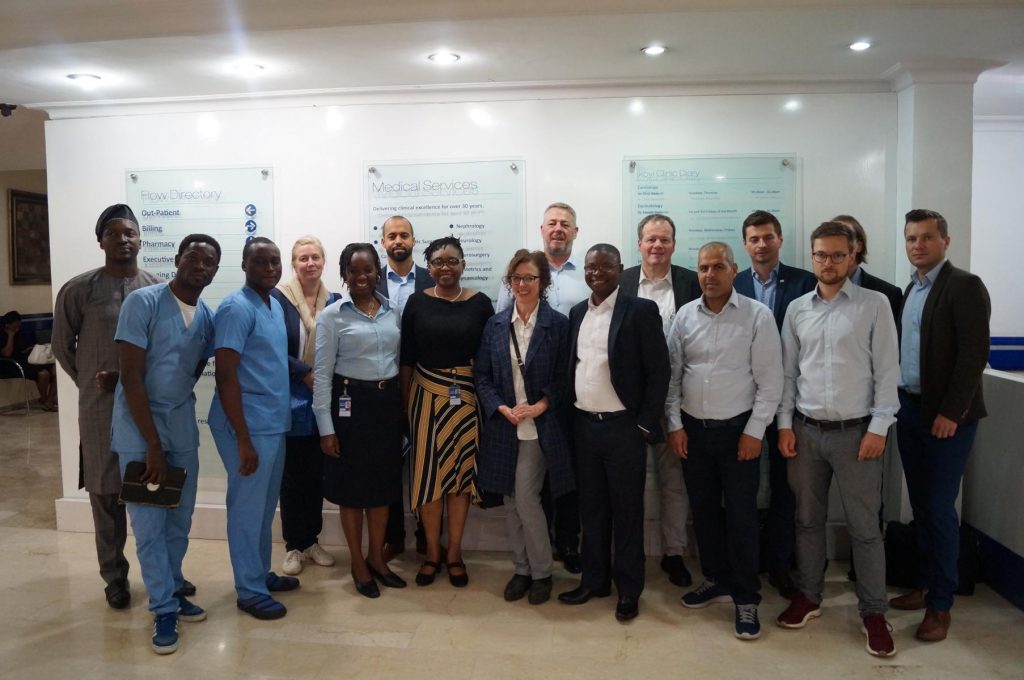
Greatly inspired by a very succesful delegation trip to Nigeria in June 2019, our CEO Philip Okito wrote this afro-optimistic and very comprehensive article about the potential of the Nigerian healthcare market. When you have finished reading this article, you will know:
- how foreign healthcare companies can contribute to the development of the Nigerian healthcare infrastructure.
- about the potential of the Nigerian health market.
- about specific projects and product demands.
- how to build strong business relations with Nigerian companies.
- how Nigeria is dealing with the Covid 19 pandemic and which, actually positive, impact is has on their health market.
Enjoy the read!
Introduction
“The next four years will be the healthcare years of Nigeria!”
said Anthony Abou Nader in June 2019 at the healthcare symposium in Abuja. Mr. Nader is the CEO of Tanit Medical Engineering, a medical equipment distributor that has been successfully active in Nigeria for several years. With his statement he was addressing a German delegation of medical technology manufacturers that seek to enter the Nigerian Market.
Nigeria and its healthcare market have huge growth potential but it also faces tremendous difficulties. A change of the local healthcare system is needed and it has to come through commitment from the public sector, contribution from the private sector and collaboration with foreign healthcare companies.
Added to this is the current issue of the Covid 19 pandemic, which is still firmly in control of the world at the end of 2020 and whose consequences are being felt everywhere, not least in the economic performance of practically all countries worldwide. Nigeria’s development is also being negatively affected by the pandemic, for example, GDP is forecast to fall by around 3.4%. The impact on the development opportunities for the health sector is currently difficult to determine. This blog article summarizes the trends prior to the Covid 19 pandemic in the summer of 2019 and attempts to incorporate the current state of affairs in the best possible way.
Within this project we advised and supported eight German healthcare companies to establish business relations with Nigerian business partners. In this article we will summarize the insights we gained throughout the past 12 months of the project and future developments.
Nigeria, Africa’s emerging giant still suffers of growing pains
Nigeria is the biggest black population in the world with approximately 200 Mio. people. Today, every 6th African is Nigerian. The growth rate of the Nigerian population is tremendous with more than 5 Mio. people adding yearly. According to the United Nations the population of Nigeria will double and reach 400 Mio. by 2050. Nigeria is not only the biggest population of Africa, but also the biggest economy and this is mostly due to its strong oil and gas sector. Nigeria is already among the world’s top 20 oil & gas producers today and among the top 10 worldwide in reserves.
The growing population and economy makes Nigeria not only an attractive consumer market but also an attractive healthcare market, with a growing demand for medical services.
Here are some of the challenges that Nigeria faces:
• Increased heart disease, diabetes and cancer due to adoption of western lifestyle, especially in bigger Cities like Lagos, Kano and Ibadan
• Child mortality rate is among the highest worldwide with 1 out of 5 children dying before the age of five.
• Maternal death: Nigeria is statistically one of the last countries worldwide with 1 out of 13 women dying while giving birth.
The demand for healthcare services in Nigeria is high and will increase with the growth of the population. Unfortunately this rising demand cannot be covered by Nigeria’s weak healthcare system today:
• There are currently 3,500 hospitals in Nigeria with 70% being privately owned. Nigeria’s shocking 0.8 beds per 1,000 inhabitants compares poorly to 8 beds per 1,000 inhabitants in Germany.
• Although Nigeria has well educated and trained physicians, the total amount of medical professionals such as doctors, nurses and midwives is too low to provide sufficient services to its growing population (0.4 doctors per 1,000 inhabitants). Especially in rural areas the coverage of medical services is very thin. These statistics are even worsened by a growing amount of specialists migrating abroad causing a major brain drain effect.
• Less than 10% of Nigeria’s population is insured and therefore 2/3 of the costs for medical services are paid by the patients. Unfortunately, most often only the high-income population is able to afford medical treatment. This is a major topic that the public sector wants to tackle with its vision to insure 100% of the population by 2020.
From today’s perspective, this goal seems unrealistic; however, until this ambitious goal is achieved most potential patients come from the high-income population. Their trust in the local healthcare system is low and they seek treatment abroad. That’s why yearly over 30,000 Nigerians travel abroad for treatments such as open heart surgeries, renal transplants, brain surgeries, cancer and eye treatment. The travel destinations are western countries like the US, UK and Germany but also emerging markets like UAE, South Africa and India, where treatment is cheaper. An estimated $1.35 billion is spent on these therapies yearly. Nigeria’s losses to medical tourism thus mount up to more than its total health budget 2018.
It may seem paradoxical at first glance, but the Covid 19 pandemic could have a positive impact on Nigeria’s health system. Germany Trade and Invest, for instance, explains that the corona crisis could lead to a rethink in the industry and to increased investment in the health sector. This is due to the fact that it is currently not possible to travel abroad to receive medical services and that the country’s middle and upper classes are also dependent on national health care. According to this, however, an increase in private investment and private health expenditure is considered likely.
Fortunately, it can be said at this stage that the Covid 19 pandemic has not yet hit Nigeria too hard. At the beginning of November, around 63,000 infections and 1147 deaths were recorded. GTAI experts explain, however, that this low number is rather due to the limited availability of test kits. The estimated number of unreported cases will most likely be significantly higher. The economic consequences are much worse. The drop in oil prices, which has been exacerbated by the global lack of demand, is affecting the country’s economy. The country’s total industrial production is expected to fall by 9.5% in 2020. In the service sector, the decline is estimated at around 3.5%. It is important to monitor further developments closely.
Vision: Nigeria should turn its health problem into a health asset and become the medical hub for the West African region
In his speech in Abuja, the honorable Prof. Onyia said
“Instead of losing over $1 billion yearly to medical tourism, Nigeria should invest in the local healthcare infrastructure and treat its people themselves. But let’s not stay there; Nigeria should be the medical hub for the whole West African region.”
Prof. Onyia, is the advisor for the Office of the Vice President and Minister for Power, Works and Housing and therefore strongly linked to the federal government.
During this speech, Prof. Onyia had no idea of the upcoming Covid 19 pandemic in 2020 and the resulting weakening of the economy. Nevertheless, the pandemic offers some potential for the Nigerian health system, as no one can leave the country for medical services due to travel restrictions. As already mentioned, the experts from Germany Trade and Invest expect that a rethink could take place, leading to increased private investment and health spending. It remains to be seen to what extent this forecast is correct. The further development of the pandemic worldwide will be decisive.
This vision of Nigeria being the medical hub for West Africa could be a driver for investments in the healthcare sector. Multiple projects were already launched by the public sector to tackle this opportunity and more are in the pipeline.
Here are two interesting public projects:
• Dr. Umuzuruike the commissioner of Health of Ebonyi State attended the conference with the German delegation. He informed us that Ebonyi state is building a teaching hospital and that they seek equipment and hospital management from Germany.
• A similar project is the Enugu Diagnostic Center, a promising project that was launched several years ago as a flagship project in the southeast region of Nigeria. For example the newly built centre in Enugu state will be equipped with state-of-the-art MRI CT and X-Ray units and a renal dialysis unit. On behalf of the invitation of the Governor of Enugu, trAIDe visited Enugu and inspected the Diagnostic Center. They are also looking for German equipment and hospital management.
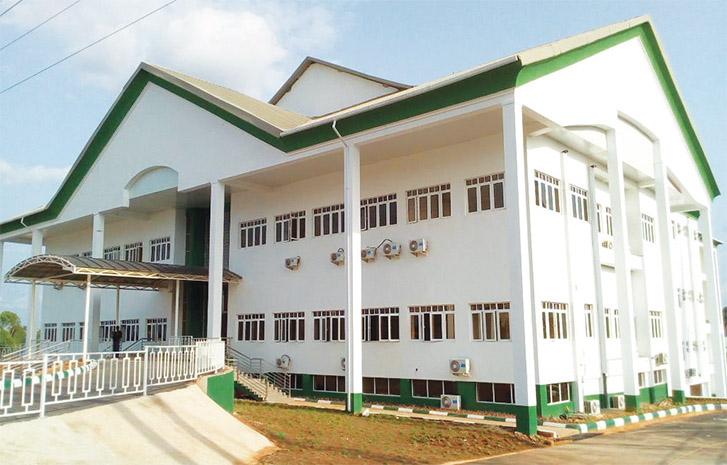
Although Nigeria’s government has strengthened the vision of improving the healthcare sector by increasing the number of projects and their total investments, unfortunately, public projects are often not realized. There are several reasons for that. Many times it is a lack of detailed planning and execution. I have seen healthcare projects in Nigeria being launched without a business plan, a construction plan or any idea on how to actually manage and operate the hospital. Another factor contributing to the low implementation rate of public healthcare projects is the immense problem of corruption. As in many countries, corruption is considerably higher amongst public projects compared to private investment projects.
The private sector has also caught on to the opportunity in the healthcare market, but seems to be executing far more effectively.
Here are two interesting private healthcare projects:
- When we travelled to Lagos, we visited Lagoon hospitals, one of the biggest healthcare hospital chains in Nigeria. The hospital chain operates 6 hospitals in Lagos alone and treats more than 270.000 patients per year. This makes Lagoon Hospitals the largest healthcare service Group in Nigeria. Dr Olujimi Coker, Chief Medical Director & Chief of Surgery told the delegation about Lagoon hospital expansion plans. “The demand for medical services is high and we plan to deliver high quality medical services. That’s why we are planning to invest and to expand our current capacity of beds.” Lagoon hospitals has 32 years of experience in managing hospitals and is the only Hospital in Nigeria that is accredited by the Joint Commission International.
- A joint venture project between the public and private sector is called “FIT Healthcare”. In order to follow the vision of providing healthcare services to Nigeria and preventing Nigerians from traveling abroad for treatment, the local state government of Enugu plans to build Nigeria’s first health tourism district. Enugu in Southeast Nigeria was carefully selected to be the project location, since it can be easily reached from all directions of Nigeria via the Enugu international airport. The airport hosts Ethopian Airlines flights and will soon expand with the Air Peace international hub. The City of Enugu is also amongst the top three in real estate value appreciation of cities in Nigeria. I met the executive director of FIT Healthcare Ltd., Uche Okoli, in Lagos. He explained that the joint venture aims at building a health district as a response to the Nigerians’ question of where to get treatment for medical problems. The vision is not only a world class hospital with 250 beds, but also to have it be surrounded by a shopping mall, a hotel, offices and residences. By delivering high quality medical services in a lifestyle location some percentages of the medical tourism expenses will be retained within the country. Mr. Okoli stressed that in order to achieve this, they are looking for collaboration with Germany. There is a high interest for medical equipment and hospital management services from Germany.
The interest from the Nigerian side is obviously high, so I would like to provide some insights on how to start matching the demand.
Nigeria’s need for foreign support offers large potential for healthcare companies
The country is so big, the healthcare system so poor and the opportunities so many. Now what should you focus on, the private or the public sector? And what are the healthcare sub-sectors with the biggest potential in the future?
Here are some recommendations and our top findings that we have gathered in this project:
Private vs. public sector? As mentioned above, both sectors are very active in the healthcare market with ambitious goals. What speaks for the public sector? It is the duty of the public sector to provide healthcare services for the inhabitants. And with Nigeria being among the richest countries in Africa, there should be a potential for healthcare turnaround in Nigeria. Unfortunately, there are too many hurdles in the way for the public sector to effectively execute the change process. Among them are lack of planning and execution of projects, lack of know how in running hospitals effectively and too much corruption. The private sector on the other hand also faces these difficulties but seems to be far more effective in handling them. Local and foreign investors such as Hygeia have successfully implemented major healthcare projects such as lagoon hospitals. There just seems to be a different commitment from the stakeholders to execute the project effectively behind private investments projects. Our recommendation is to focus on doing business with the private sector or to consider your involvement in PPP projects.
Areas with big growth potential
These medical devices/disposables are in high demand:
- Diagnostic Equipment – particularly the radiological and imaging devices (Magnetic Resonance Imaging (MRI), Computed Tomography scan (CT), Digital X-Ray, Ultrasound, Mammography and Ultrasound Scans)
- Medical disposables, especially those for testing for malaria parasites, drug abuse, and infectious diseases such as HIV/AIDS and tuberculosis
- Primary Care Devices e.g. Ventilators, point of care (POC) tools, furniture
- Laboratory Equipment
Investment in local facilities or specific medical tourism projects:
- There is a big demand for specialized health care such as treatments for cancer, laser surgery, cosmetic surgery, kidney transplant, neuro and cardio health support
- Co-operations between local hospitals and specialized European hospitals such as orthopedics and kidney transplants or even cosmetic surgery. Most of the health tourists fly to India to get treatment. Treatment in Europe can be attractive because of the logistic advantages
E-Health and Telemedicine:
- This is clearly lacking in many public health facilities. A lot of health care service providers still operate manually. Digital hospital management systems are needed
- Due to the poor coverage of healthcare services especially in rural areas there is a high demand for services such as telemedicine or telecardiology
- Financial services for the healthcare system
- For Nigerian companies such as hospitals or medical distributors it is very costly to finance the equipment. Double digit interest rates are a standard, sometimes going as high as 25%. Even though there are some European development banks that offer financial services with lower interest rates, the loans start at a minimum amount of 5 Mio. €
- Financial services that give out loans for medical investments starting from 50.000€ and with a single digit interest rate are in high demand
Used medical equipment:
- The reputation for used medical equipment is not very good in Nigeria because the lifespan of used equipment is often poor. If used equipment providers can ensure the quality of their used equipment and/ or give out warranties, there is a huge market in Nigeria.
Nigeria has an enormous growth potential – especially within the healthcare sector. Demand is high, public and private investments are starting to tackle existing challenges. Furthermore, private investment could experience growth due to the Covid 19 pandemic and the associated travel restrictions. The government’s vision is to give the population a healthcare perspective and the health tourists a local healthcare alternative. Nigeria needs foreign healthcare partners who want to contribute and profit from the vast opportunities. In order for foreign companies to initiate and make sustainable business in Nigeria they have to be somehow present. Present either through own subsidiaries or through local distributors or partners. In our past articles “How to find the right business partner in Nigeria” and “10 tips on how to find the right business partner in Nigeria” we explain how you can screen and find the right business partner and kickstart your market entry to Nigeria.
With one smiling and one crying eye we want to announce that this was the last blogpost about the Nigerian health market and we will move on to a new “Country of the season”.
But we have a special gift for you! We have summarized all the information we have gathered within our projects and during our series on one compact document! There you will find SWOTs about Nigeria and the Nigerian health market, facts about medical tourism and future visions, the business culture in Nigeria, possible forms of market entry, practical tips for business partner identification, and financing and product registration.
Are you interested in entering the Nigerian healthcare market or another promising market in Africa?
Then we have good news for you! We have been accredited by the Federal Ministry for Economic Affairs and Climate Action as Africa-Consultant. You can apply for a consulting voucher and get 75% of your costs funded. Click on the button to learn all the details about this great offer: Consultation Voucher for Africa – Secure 75% funding!

